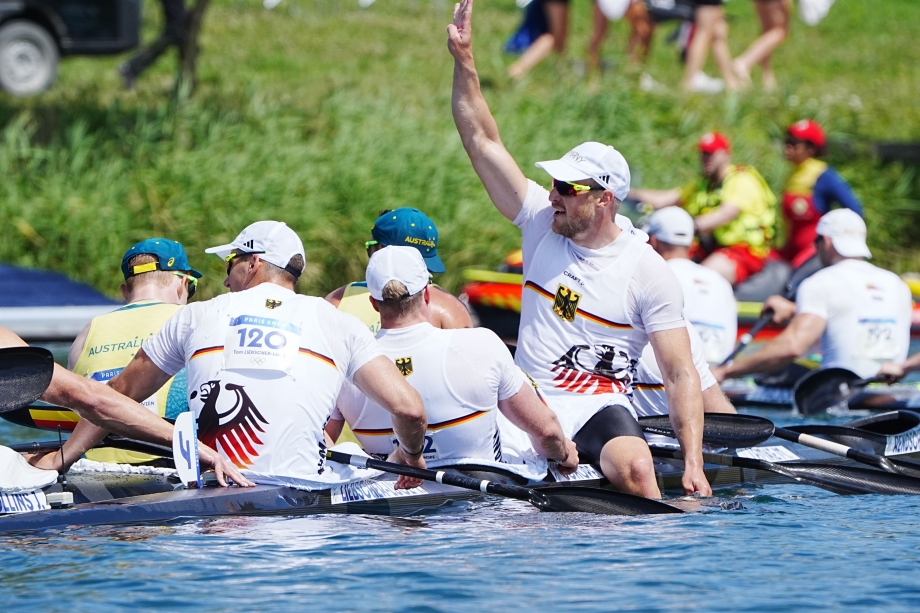Lisa Carrington claimed an historic sixth Olympic gold medal as she piloted New Zealand to a first-ever women’s kayak four 500m title, while Germany retained the men’s K4 500m crown and China triumphed in the men’s canoe double 500m.
New Zealand’s victory at the Paris 2024 Olympics ended the duopoly of Hungary and Germany in the event that stretches back to 1988.
No country has won Olympic gold in the women’s K4 500m other than Germany or Hungary since Romania emerged victorious at Los Angeles 1984.
Germany and Hungary were both in contention to continue that run, only for Carrington to steer New Zealand to glory.
The New Zealand crew of Carrington, Alicia Hoskin, Olivia Brett and Tara Vaughan looked to stamp their authority on the race in the opening stages.
Germany put New Zealand under intense pressure as they looked to edge ahead before Carrington’s team found an extra gear.
New Zealand crossed the finish line in 1:32.20 to take the title as Carrington celebrated a sixth Olympic crown, matching the gold-medal hauls of Sweden’s Gert Fredriksson and Hungary’s Danuta Kozak.
Only Germany's Birgit Fischer has more golds with eight.

"This one is pretty special to do it with these girls,” said Carrington.
“The amount of work that we have all put in is pretty special.
“You never know what the end result is going to be when you line up and I think that is why sport is so thrilling.
“It's such a privilege to be out there with the best in the world and they bring out the best in us."
Germany finished in 1:32.62 for silver, while Hungary’s hopes of a fourth successive title in the event came to an end as they won bronze in 1:32.93.
There was joy for Germany in the next race as they captured the men’s K4 500m title for a second straight Games.
Spain started strongly, leading at the half-way mark before Germany hit the front with Max Rendschmidt, Max Lemke, Jacob Schopf and Tom Liebscher-Lucz upping the stroke rate.
It was a thrilling fight to the finish as the German team triumphed by just 0.04 from Australia, while Spain took bronze in 1:20.05.
“It was quite tight, so we didn’t know that we had won,” said Lemke.
“I had a feeling that we were in front in the last 25 metres, but the Australians had a pretty good speed at the end so I wasn’t sure if we got first or second across the finish line.
“After we saw the sign we were super happy that all the hard work over the past three years paid off and we managed to win as the favourites here, which was very hard for our mind but we are a very good team and we managed to get through it together.”
The Chinese duo Hao Liu and Bowen Ji were the other winners of the day as they were crowned men’s C2 500m champions.
They follow in the footsteps of China’s Guanliang Meng and Yang Wenjun, who won the event at Athens 2004 and Beijing 2008 when it last featured on the Olympic programme.

Liu and Ji were involved in a tussle with Individual Neutral Athletes (AIN) Zakhar Petrov and Alexey Korovashkov over the first 250 metres before the Chinese pair started to pull away.
They triumphed in 1:39.48 before a late surge from both Italy’s Gabriele Casadei and Carlo Tacchini and Spain’s Joan Antoni Moreno and Diego Dominquez saw them claim silver and bronze respectively.
It is Liu’s third Olympic medal and first gold after winning silvers in the men’s C2 1000m and men’s C1 1000m at Tokyo 2020.
"In Tokyo I took two silver medals, so winning the gold medal means a lot to me and it's very important for my country as well,” said Liu.
“It's compensation for what I've done up until now.
"I always believe I have the power to win.
“We have a great team and everybody worked really hard to make sure we put in everything to the end."
The silver won by Casadei and Tacchini was Italy’s first medal in the C2 since Francesco La Macchia and Aldo Dezi came second over 1000m at Rome 1960.




